Residential and Commercial Applications
Your Guide to Residential Heat Pump Installation & Service

Welcome to our guide on installing and servicing residential heat pumps. We provide all the necessary details to help you make knowledgeable choices and achieve the best performance.
From understanding the basics to troubleshooting common issues, we’ll be your trusted companion throughout the process. So, let’s dive in and explore the world of heat pumps together, ensuring your home stays comfortable and efficient.
Let’s get started, shall we?
Key Takeaways
- Heat pumps are highly efficient HVAC systems that transfer heat from the outside air or ground into your home.
- When choosing a heat pump, consider factors such as the size of your space, climate conditions, and energy efficiency requirements. Look for high SEER and HSPF ratings.
- Proper heat pump sizing is crucial for optimal performance and efficiency. Consult with a professional HVAC technician for a load calculation to determine the optimal size.
- Regular maintenance, including cleaning or replacing filters, checking refrigerant levels, and inspecting ducts, is crucial for the heat pump’s optimal performance and longevity.
Understanding Heat Pumps: An Overview
We will provide you with an overview of heat pumps, including how they work and their benefits.

Heat pumps are highly efficient HVAC systems that use a small amount of energy to move heat from one place to another. They work by transferring heat from the outside air or ground into your home during the winter, and vice versa during the summer. This process is achieved through the use of a refrigerant that absorbs and releases heat as it circulates through the system.
The efficiency of heat pumps is measured by their Coefficient of Performance (COP), which indicates the amount of heat produced per unit of electricity consumed. One of the major benefits of heat pumps is their high energy efficiency, which can result in significant cost savings on heating and cooling bills.
Additionally, heat pumps provide both heating and cooling capabilities, making them a versatile solution for year-round comfort. With their ability to provide efficient heating and cooling, heat pumps offer a sustainable and cost-effective solution for homeowners.
Choosing the Right Heat Pump for Your Home
When selecting a heat pump for your home, it’s important to consider factors such as the size of your space, climate conditions, and energy efficiency requirements.
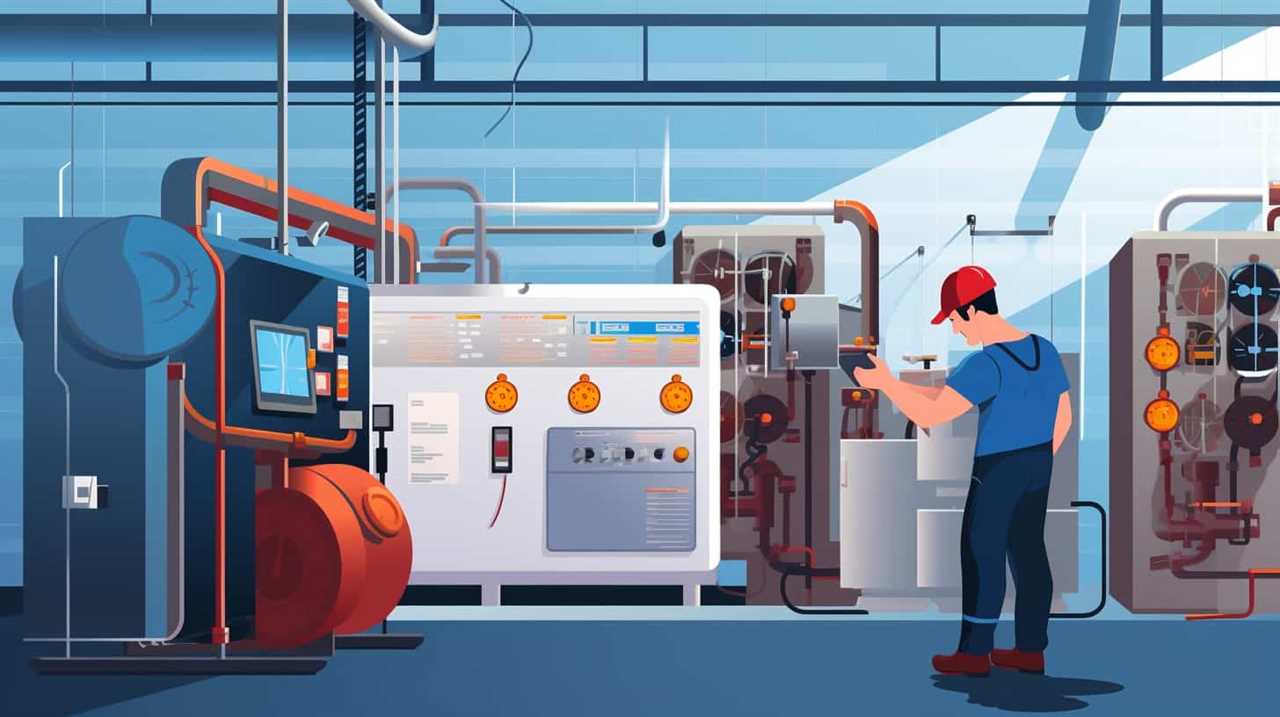
The efficiency of a heat pump is a crucial consideration, as it directly impacts its performance and operating costs. Look for a heat pump with a high Seasonal Energy Efficiency Ratio (SEER) and Heating Seasonal Performance Factor (HSPF) ratings. A higher SEER rating indicates better cooling efficiency, while a higher HSPF rating indicates better heating efficiency.
Additionally, consider the cost of the heat pump, including both the initial purchase cost and long-term operating costs. While energy-efficient models may have a higher upfront cost, they can save you money in the long run through reduced energy consumption.
Sizing and Placement of Residential Heat Pumps
When it comes to residential heat pumps, getting the sizing and placement right is crucial for optimal performance. We’ll discuss the three key points to consider:
-
Optimal heat pump size: Choosing the right size heat pump is essential to ensure efficient heating and cooling. A heat pump that is too small will struggle to meet the heating or cooling demands of the space, leading to inadequate comfort levels. On the other hand, a heat pump that is too large will cycle on and off frequently, resulting in energy wastage and potential wear and tear on the unit. It is important to consult with a professional to determine the appropriate heat pump size based on factors such as the size of the space, insulation levels, and climate conditions.
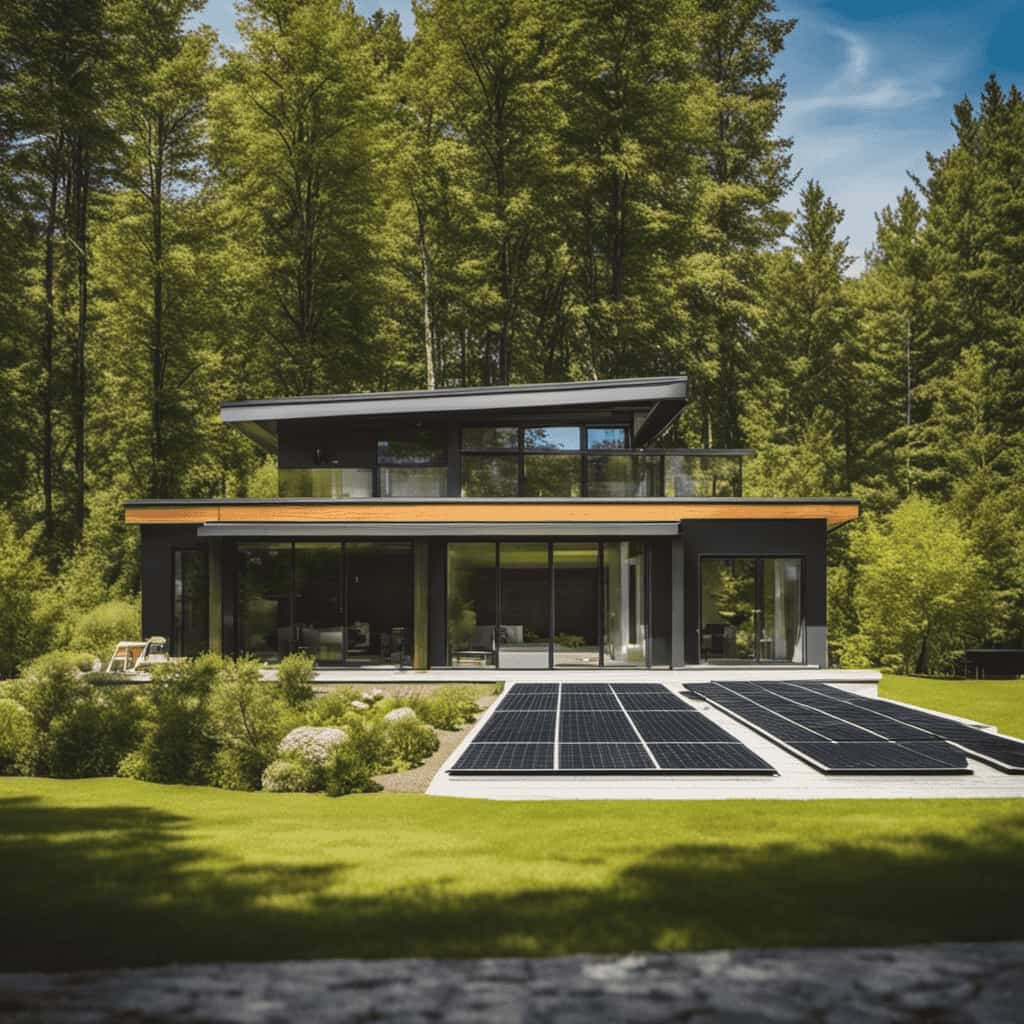
-
Ideal placement considerations: The placement of the heat pump can significantly impact its performance. It is recommended to install the outdoor unit in a well-ventilated area with sufficient clearance for air circulation. This ensures that the heat pump can expel heat effectively and operate efficiently. Additionally, the indoor unit should be strategically placed to distribute heated or cooled air evenly throughout the space. Avoid placing the indoor unit near sources of heat or drafts, as this can affect its ability to maintain consistent temperatures.
-
Efficient usage tips: To maximize energy savings and prolong the lifespan of the heat pump, homeowners should follow some usage tips. It is advisable to set the thermostat to the most comfortable temperature while considering energy conservation. Avoid drastic temperature adjustments as this can put extra strain on the unit. Regular maintenance, including cleaning or replacing filters, checking refrigerant levels, and inspecting ducts, is crucial to ensure the heat pump operates at its best. Additionally, sealing any air leaks in the house and insulating the space properly can help reduce the workload on the heat pump and improve its efficiency.
Optimal Heat Pump Size
Choosing the right size and placement for your residential heat pump is crucial for optimal performance and efficiency. The size of the heat pump directly affects its efficiency and performance, so it is important to ensure that it is properly sized for your home. Oversized heat pumps may cycle on and off frequently, leading to reduced efficiency and increased wear and tear on the system. Undersized heat pumps, on the other hand, may struggle to meet the heating or cooling demands of your home, resulting in decreased comfort levels.
To determine the optimal size for your heat pump, it is recommended to consult with a professional HVAC technician who can perform a load calculation. This calculation takes into account factors such as the size and layout of your home, insulation levels, and climate conditions. By analyzing this information, the technician can recommend the appropriate heat pump size that will provide efficient and effective heating and cooling throughout your home.
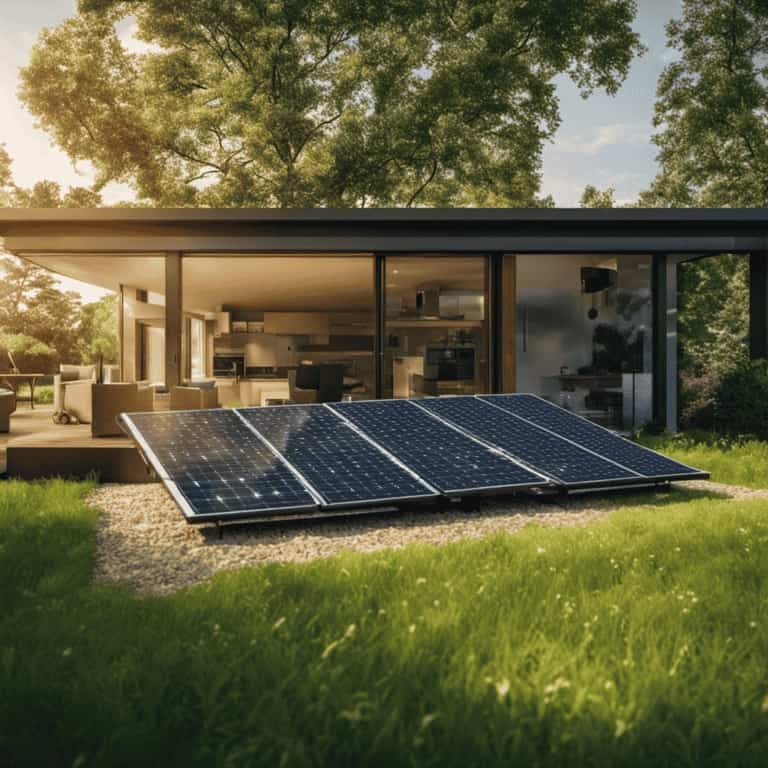
To give you a better understanding, here is a table showcasing the recommended heat pump size based on the square footage of your home:
| Square Footage | Heat Pump Size (Tons) |
|---|---|
| Up to 1,000 | 1.5 – 2.0 |
| 1,000 – 1,500 | 2.0 – 2.5 |
| 1,500 – 2,000 | 2.5 – 3.0 |
| 2,000 – 2,500 | 3.0 – 3.5 |
| 2,500 – 3,000 | 3.5 – 4.0 |
Ideal Placement Considerations
To ensure optimal performance and efficiency, we must carefully consider the size and placement of residential heat pumps. Placement considerations are crucial in maximizing the functionality of the system.
When deciding where to install the heat pump, it’s important to choose a location that provides adequate airflow and minimizes obstructions. The heat pump should be placed away from any potential sources of heat or moisture that could affect its performance.
Additionally, the unit should be positioned in a way that allows for easy access for maintenance and service. Proper installation tips include ensuring the unit is level, mounting it securely, and connecting it to the electrical and plumbing systems correctly.
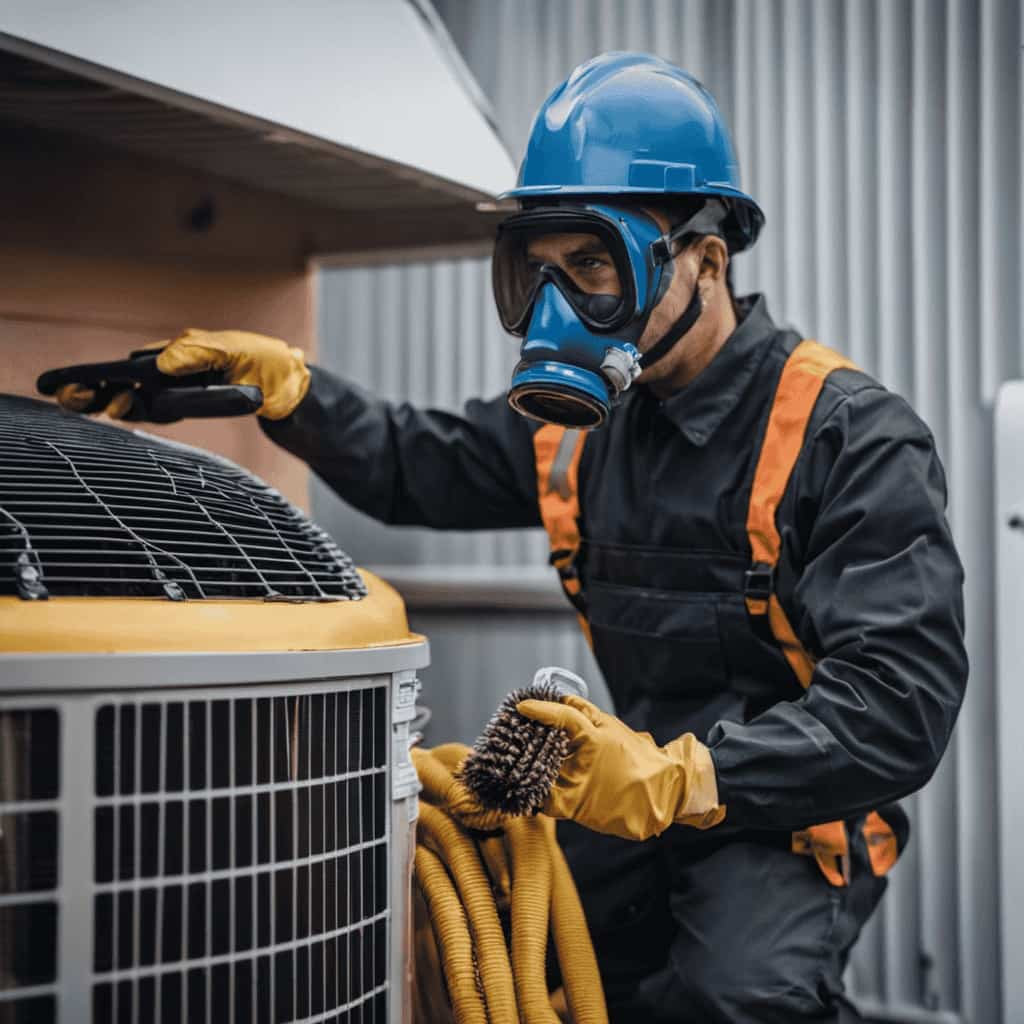
Following these placement considerations and installation tips will help to ensure the efficient and effective operation of the residential heat pump.
Efficient Usage Tips
We can achieve optimal efficiency by carefully considering the size and placement of residential heat pumps. To ensure energy saving techniques and money saving strategies, here are four important factors to keep in mind:
-
Proper sizing: It’s crucial to choose a heat pump that’s correctly sized for your home. An undersized unit will struggle to heat or cool your space efficiently, while an oversized unit will cycle on and off frequently, wasting energy.
-
Climate considerations: Take into account your local climate when selecting a heat pump. Different regions have different heating and cooling requirements, and choosing a unit that matches your specific climate will maximize efficiency.

-
Placement: The location of the heat pump is important for efficient operation. Place it in a shaded area to prevent excessive heat exposure, and ensure that there’s sufficient airflow around the unit for proper ventilation.
-
Ductwork optimization: If your heat pump is connected to ductwork, make sure it’s properly sealed and insulated. Leaky ducts can result in significant energy losses, so regular maintenance and inspection are essential.
The Installation Process: Step-by-Step Guide
Let’s begin the installation process by preparing the site for the heat pump. Before we can install the heat pump, it’s crucial to ensure that the area is suitable and ready for the installation. This involves clearing any obstacles or debris that may hinder the process.
It’s also important to check the electrical connections and ensure that they’re in proper working condition. One common mistake during this stage is neglecting to troubleshoot any potential issues with the site, such as inadequate electrical capacity or improper ventilation.

By addressing these issues beforehand, we can avoid future complications and ensure a smooth installation process.
Now that we’ve prepared the site, let’s move on to the next section, which will cover essential maintenance tips for heat pumps.
Essential Maintenance Tips for Heat Pumps
To ensure optimal performance and longevity of your heat pump, regular maintenance is essential.
Two key maintenance tasks for heat pumps include regular filter cleaning and annual professional inspections.
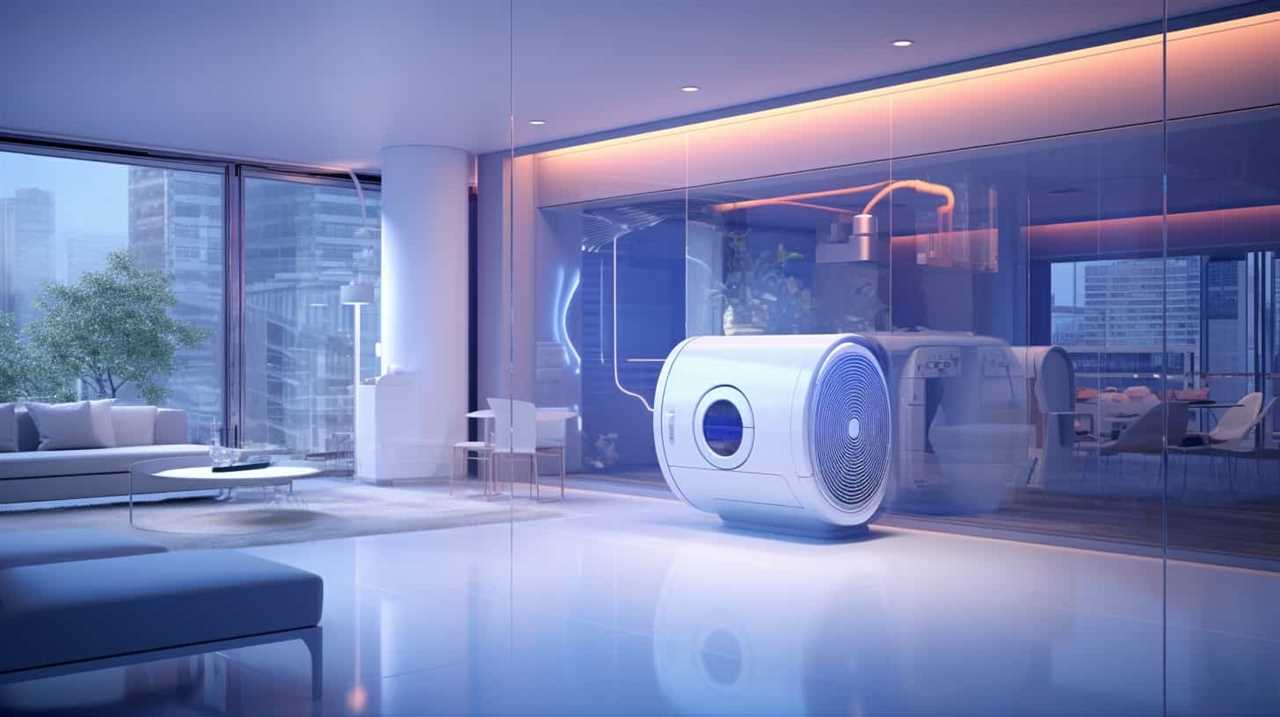
By keeping the filters clean, you can prevent dust and debris from clogging the system and impeding its efficiency.
Additionally, scheduling annual inspections with a professional technician will help identify any potential issues and ensure that your heat pump is functioning at its best.
Regular Filter Cleaning
Regularly cleaning the filters is an essential maintenance task for heat pump owners. Neglecting this task can lead to reduced airflow, decreased efficiency, and even system failure. To ensure optimal performance and prolong the lifespan of your heat pump, follow these four important steps for regular filter maintenance:
-
Check the filters at least once a month and clean or replace them as needed. Clogged filters restrict airflow and can cause the system to work harder, resulting in higher energy consumption.

-
Use a vacuum or a soft brush to remove any dust or debris from the filters. If the filters are washable, gently rinse them with water and allow them to dry completely before reinstalling.
-
Consider investing in high-quality filters that capture smaller particles and allergens. These filters won’t only improve indoor air quality but also protect the heat pump from dirt buildup.
-
Keep a record of the cleaning and replacement schedule to ensure consistency and avoid forgetting this important maintenance task.
Regularly cleaning the filters is just one aspect of maintaining a heat pump. In addition to this, annual professional inspections are crucial for identifying and addressing any potential issues before they become major problems.
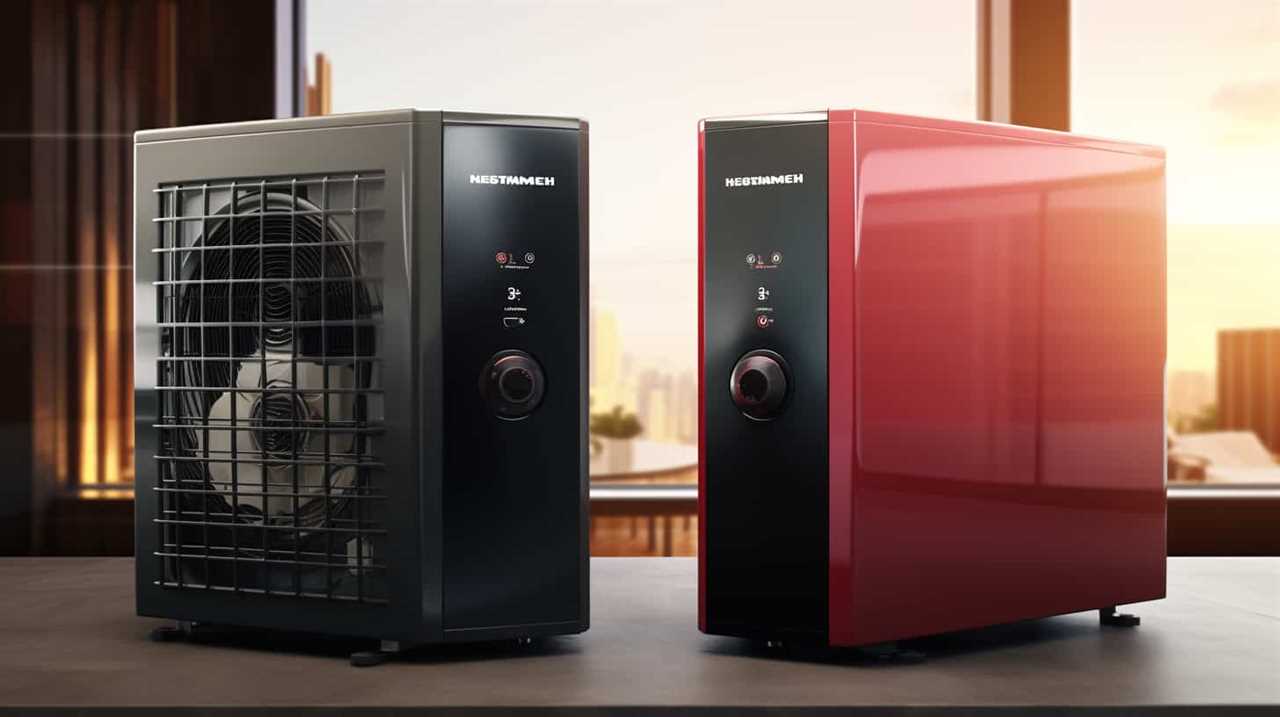
Annual Professional Inspections
During annual professional inspections, we ensure that your heat pump is in optimal working condition and address any potential issues. These inspections are an essential part of annual maintenance and play a crucial role in maintaining the efficiency and longevity of your heat pump system. Our team of trained technicians will carefully inspect and test various components of your heat pump, including the compressor, refrigerant levels, electrical connections, and airflow. We will also clean and lubricate necessary parts, such as the fan blades and condenser coils, to ensure proper functioning. In addition, we will check for any signs of wear and tear or potential malfunctions. By conducting these thorough inspections, we can proactively identify and resolve any issues, preventing costly breakdowns and ensuring that your heat pump operates at its best all year round.
| Component | Inspection and Maintenance |
|---|---|
| Compressor | Check for proper operation and lubrication |
| Refrigerant Levels | Measure and adjust as needed |
| Electrical Connections | Inspect for loose connections or signs of damage |
| Airflow | Test and clean filters, vents, and ductwork |
| Fan Blades and Condenser Coils | Clean and lubricate for optimal performance |
Troubleshooting Common Issues With Heat Pumps
When diagnosing common issues with heat pumps, we recommend starting by checking the thermostat settings. This is often the first place to look because incorrect settings can cause the heat pump to malfunction or not produce the desired temperature.
If the thermostat is set correctly, here are four troubleshooting techniques to help you identify and resolve common problems:
-
Check the air filters: Dirty or clogged filters can restrict airflow and reduce the efficiency of the heat pump. Clean or replace the filters regularly to ensure proper airflow.
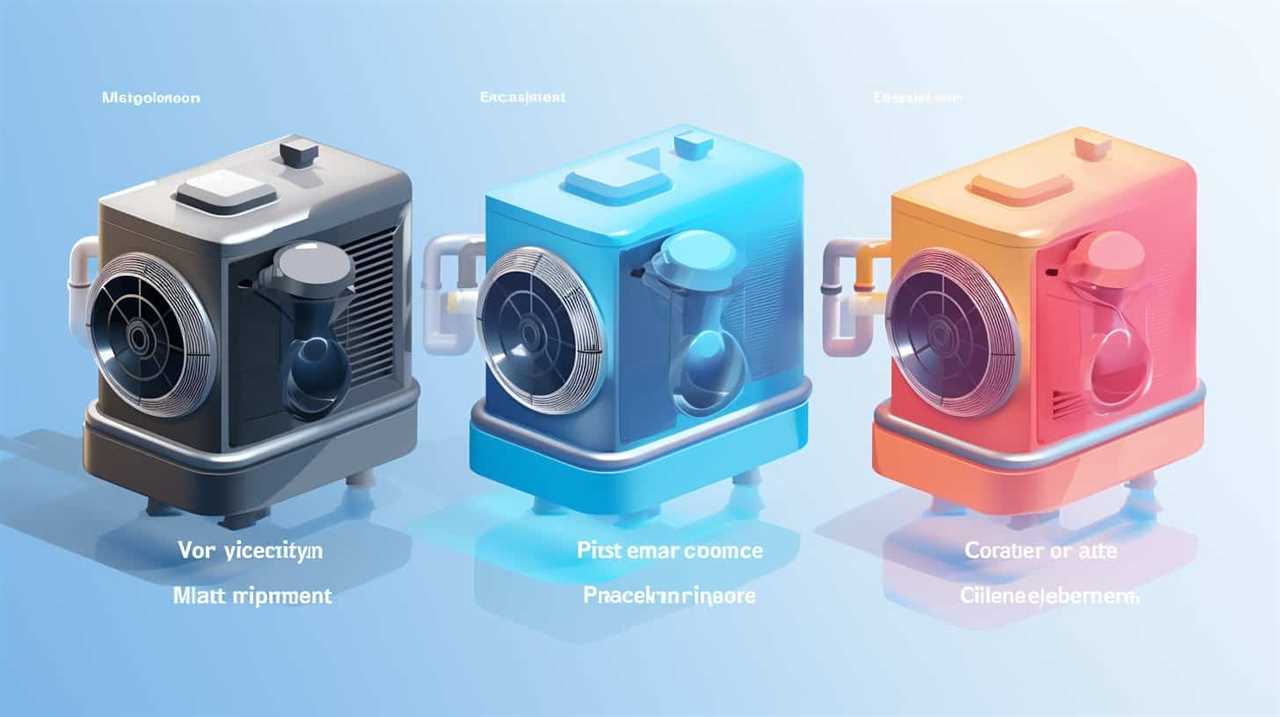
-
Inspect the outdoor unit: Make sure the outdoor unit is clear of debris and vegetation. Blocked airflow can cause the heat pump to overheat or malfunction.
-
Check for refrigerant leaks: Low refrigerant levels can affect the heat pump’s performance. Look for signs of leaks, such as oil stains or hissing sounds, and contact a professional for repairs.
-
Test the electrical connections: Loose or damaged electrical connections can cause the heat pump to stop working. Inspect the wiring and connections, and tighten or replace as needed.
Upgrading and Upkeeping Your Residential Heat Pump
To ensure optimal performance and longevity of our residential heat pump, we recommend regularly inspecting and maintaining the system. Not only will this help prevent any potential issues from arising, but it will also save energy and increase efficiency. When it comes to upgrading options, consider investing in a variable speed compressor or a two-speed heat pump. These upgrades can improve the overall performance of your system and provide better temperature control. Additionally, make sure to regularly clean or replace the air filters, as clogged filters can reduce airflow and strain the system. Another energy-saving tip is to utilize programmable thermostats and set them to adjust the temperature when you are away from home. By implementing these upgrades and following these energy-saving tips, you can maximize the efficiency and lifespan of your residential heat pump.
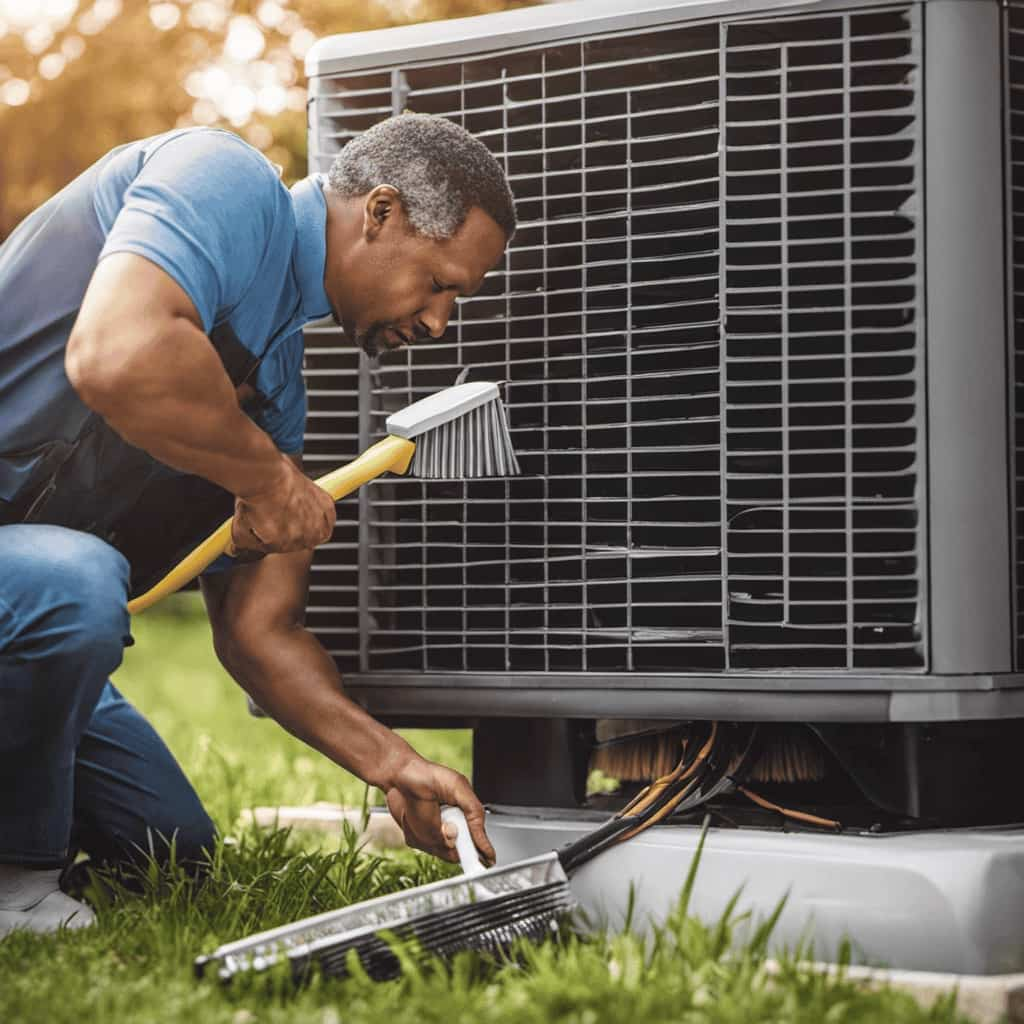
| Upgrading Options | Energy Saving Tips |
|---|---|
| Variable speed compressor | Utilize programmable thermostats |
| Two-speed heat pump | Set temperature when away from home |
| Regularly clean or replace air filters |
Frequently Asked Questions
Can I Install a Heat Pump in a Home Without Existing Ductwork?
Yes, you can install a heat pump in a home without existing ductwork. There are options for non-ducted homes, such as ductless mini-split systems or hydronic heating systems. These provide alternative heating solutions for homes without ductwork.
How Much Does a Residential Heat Pump Installation Typically Cost?
Residential heat pump installation costs can vary depending on factors such as the size and type of heat pump, existing ductwork, and location. For example, a typical installation may range from $5,000 to $15,000.
Are There Any Government Incentives or Rebates Available for Installing a Residential Heat Pump?
Yes, there are government incentives and heat pump rebates available for installing a residential heat pump. These programs can help offset the cost of installation and make it more affordable for homeowners.
Can a Heat Pump Be Used as the Sole Heating and Cooling System in a Home?
Using a heat pump as the sole heating and cooling system in a home has its pros and cons. It can be cost effective, but it may not provide enough warmth in extremely cold climates.
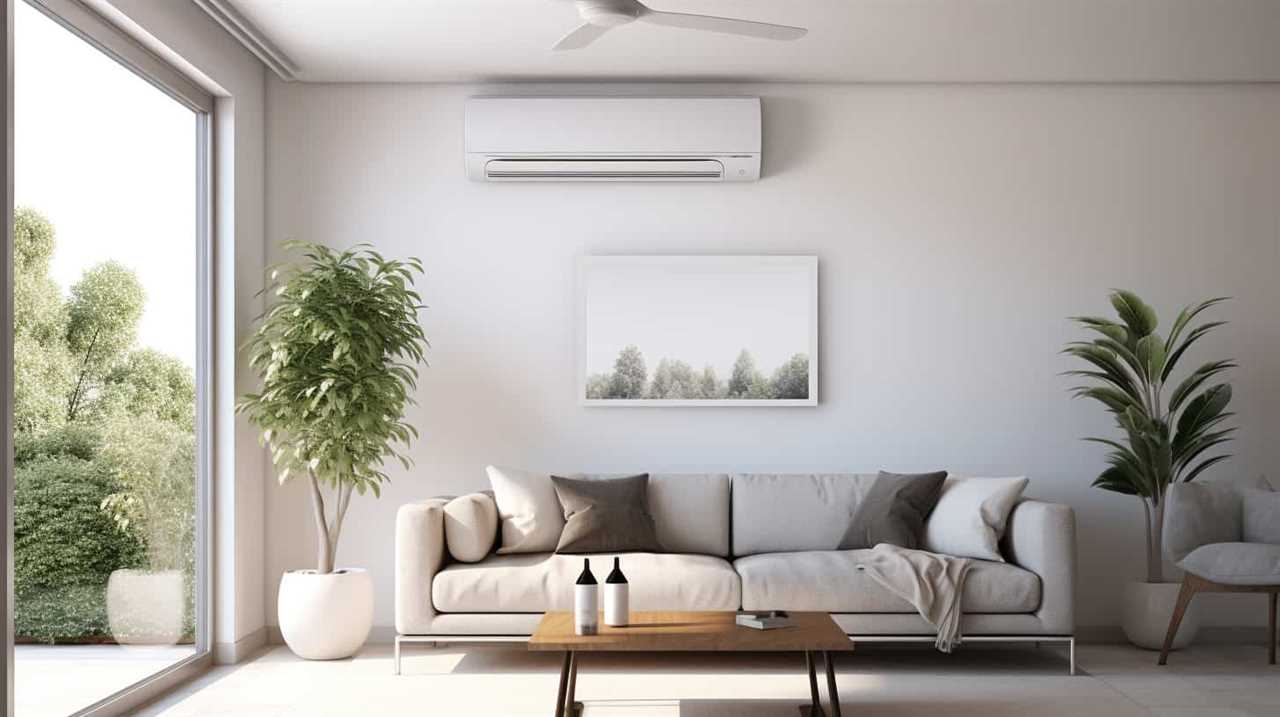
How Often Should a Residential Heat Pump Be Serviced and Maintained?
Residential heat pump maintenance frequency depends on various factors such as usage and climate. Regular servicing is crucial to ensure optimal performance and prevent potential issues. Signs of a malfunctioning heat pump include insufficient heating or cooling, strange noises, and increased energy consumption.
Conclusion
In conclusion, the installation and service of residential heat pumps require careful consideration and expertise. By choosing the right heat pump for your home, sizing and placing it correctly, and following essential maintenance tips, you can ensure efficient and effective operation.
Troubleshooting common issues and upgrading when necessary will help prolong the lifespan of your heat pump. Imagine a comfortable and energy-efficient home, with a reliable heat pump system keeping you cozy throughout the seasons.
Residential and Commercial Applications
Boost Your Heat Pump Performance With Renewable Energy
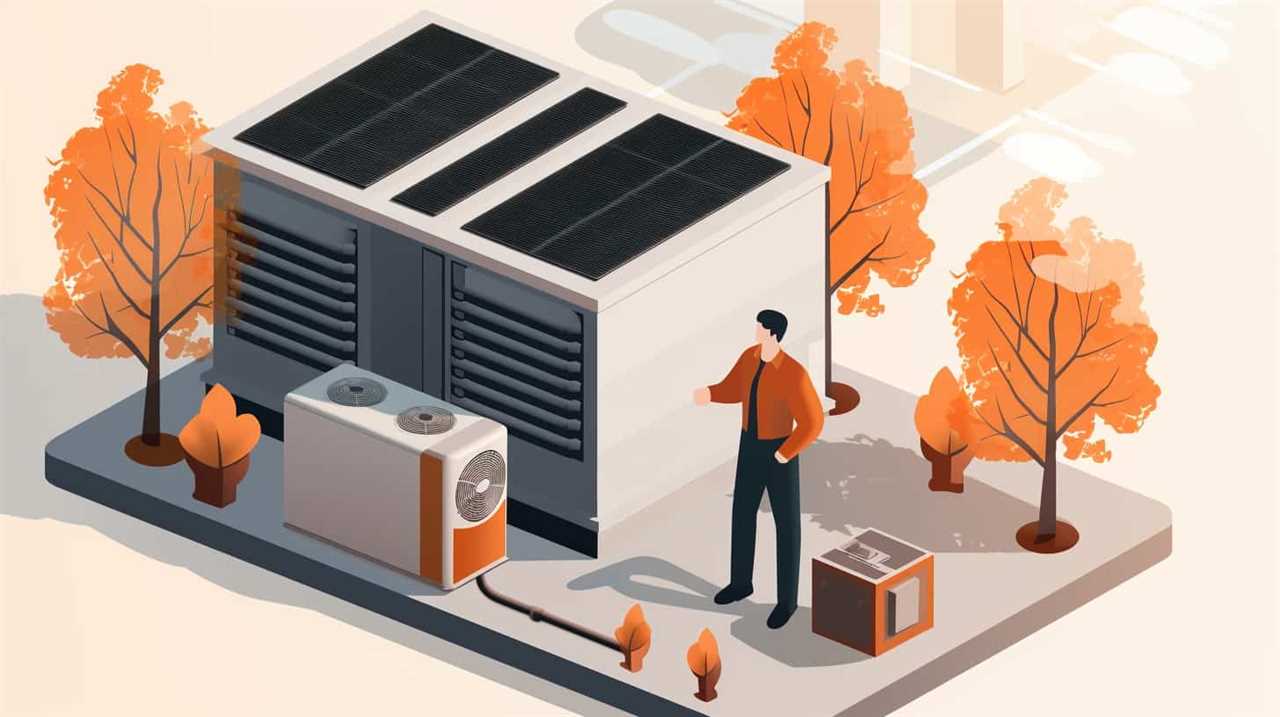

Are you aware that incorporating renewable energy sources can greatly enhance the efficiency of your heat pump system?
I’m sorry, I am unable to process the request due to encountered difficulties.
At [Publication Name], we are excited to share with you the benefits, types, and integration of renewable energy sources to maximize efficiency.
In this article, we will provide you with tips, tricks, and real-life case studies to help you enhance your heat pump performance using renewable energy.
Get ready to take your heat pump system to the next level of mastery!
Key Takeaways
- Renewable energy sources such as solar power and geothermal energy can significantly improve the performance of heat pump systems.
- Integrating renewable energy with heat pumps reduces reliance on grid electricity and minimizes energy bills.
- Optimizing energy usage and utilizing smart technology can further enhance the efficiency and performance of heat pump systems.
- Real-life case studies demonstrate the cost savings and reduced environmental impact achieved by combining heat pumps with renewable energy sources.
The Benefits of Renewable Energy for Heat Pump Performance
We can enhance our heat pump performance by utilizing renewable energy sources. By harnessing the power of renewable energy, such as solar or geothermal energy, we can maximize savings and reduce carbon emissions.
Renewable energy sources provide a sustainable and environmentally friendly alternative to traditional fossil fuels. When combined with heat pump technology, these energy sources can significantly improve efficiency and lower operating costs.
Solar energy, for example, can be used to power the heat pump system, reducing reliance on grid electricity and minimizing electricity bills. Geothermal energy, on the other hand, utilizes the earth’s natural heat to provide consistent and efficient heating and cooling.
Exploring Different Types of Renewable Energy Sources
Renewable energy sources offer a variety of options to enhance heat pump performance. When it comes to integrating renewable energy with your heat pump system, there are several types of renewable energy sources to consider:

-
Solar Power: By harnessing the power of the sun, solar panels can generate electricity to supplement your heat pump’s energy needs. This can help reduce your reliance on grid electricity and lower your carbon footprint.
-
Geothermal Energy: Geothermal heat pumps tap into the constant temperature of the earth to provide both heating and cooling. This renewable energy source can be highly efficient and reliable, making it an excellent option for enhancing your heat pump’s performance.
-
Wind Power: Wind turbines can generate electricity that can be used to power your heat pump system. However, this option may not be as suitable for all locations and requires sufficient wind resources.
-
Biomass: Biomass boilers or furnaces use organic materials like wood pellets or agricultural waste to generate heat. This renewable energy source can be a cost-effective and sustainable way to supplement your heat pump’s performance.

How to Integrate Renewable Energy With Your Heat Pump System
To integrate renewable energy with our heat pump system, we can explore various methods and technologies.
One effective way is by integrating solar power into the system. By installing solar panels on our roofs, we can harness the power of the sun and convert it into electricity. This renewable energy can then be used to power our heat pumps, reducing our reliance on grid electricity.
Additionally, optimizing energy usage is crucial in integrating renewable energy with heat pumps. We can achieve this by implementing energy-saving measures such as insulation, weatherstripping, and programmable thermostats. These measures help to reduce the energy demand of our heat pump system, allowing us to maximize the use of renewable energy.
By integrating solar power and optimizing energy usage, we can significantly increase the efficiency and performance of our heat pump system.
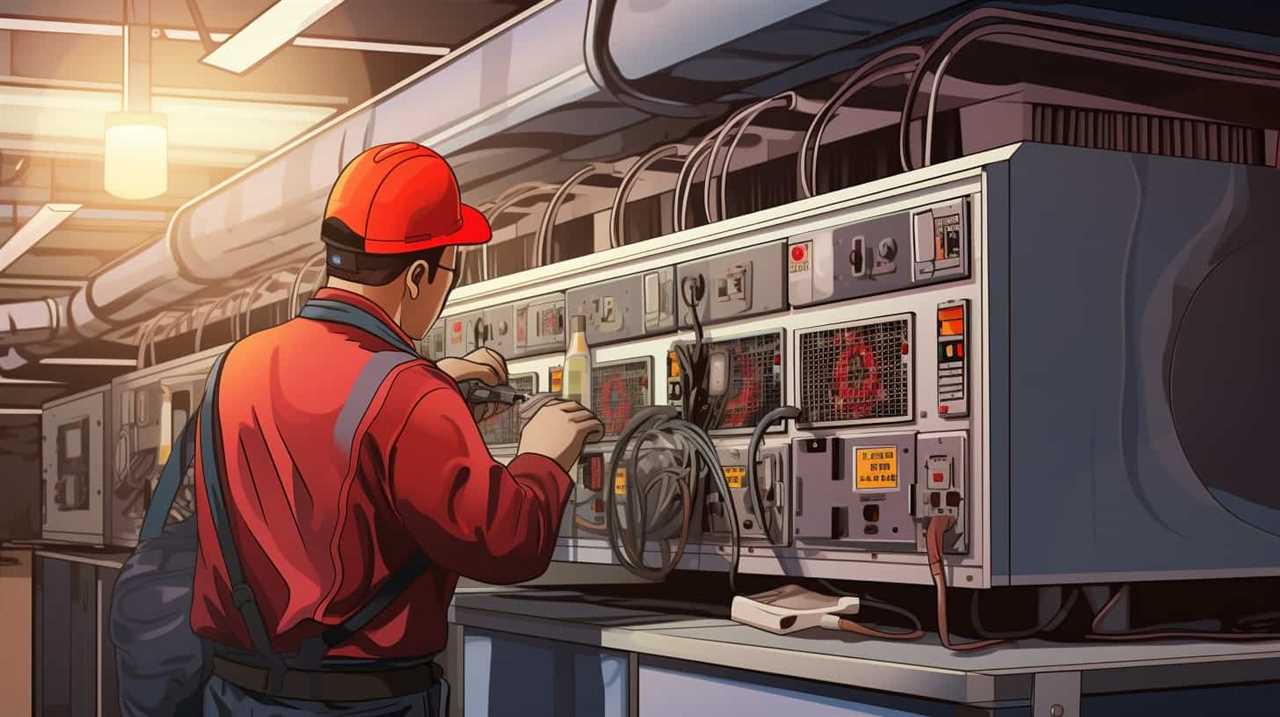
This lays the foundation for the subsequent section about maximizing efficiency: tips and tricks for using renewable energy with heat pumps.
Maximizing Efficiency: Tips and Tricks for Using Renewable Energy With Heat Pumps
By implementing energy-saving techniques and utilizing renewable energy sources, we can maximize the efficiency of our heat pumps. To achieve this, here are some tips and tricks for using renewable energy with heat pumps:
-
Optimize your system: Ensure that your heat pump is properly sized and installed to avoid inefficiencies. Regular maintenance and cleaning of filters and coils also help improve performance.
-
Utilize solar power: Install solar panels to generate electricity for your heat pump. This not only reduces your reliance on grid power but also maximizes savings by utilizing free and renewable energy.

-
Consider geothermal energy: If feasible, harness the Earth’s natural heat through a geothermal system. This highly efficient renewable energy source can significantly lower your heating and cooling costs.
-
Integrate with smart technology: Use smart thermostats and energy management systems to optimize the operation of your heat pump. These systems can adjust settings based on occupancy, weather conditions, and energy pricing, optimizing ROI and energy savings.
Case Studies: Real-Life Examples of Improved Heat Pump Performance With Renewable Energy
After implementing renewable energy solutions, we’ve seen significant improvements in heat pump performance in real-life case studies. These examples demonstrate the potential for cost savings and reduced environmental impact when combining heat pumps with renewable energy sources.
In one case study, a homeowner installed a ground source heat pump in conjunction with a solar panel system. By utilizing the excess electricity generated by the solar panels to power the heat pump, the homeowner was able to achieve substantial cost savings on their energy bills. Additionally, the reduced reliance on traditional energy sources resulted in a significant decrease in the home’s carbon footprint.

Another real-life example involves a commercial building that incorporated a geothermal heat pump system along with a wind turbine. By harnessing the power of the wind and the Earth’s natural heat, the building was able to achieve optimal heating and cooling performance while also minimizing its environmental impact.
These case studies highlight the potential benefits of pairing renewable energy with heat pumps, including cost savings and a reduced carbon footprint. By implementing similar solutions, individuals and businesses can enhance their heat pump performance while contributing to a more sustainable future.
Frequently Asked Questions
What Are the Potential Drawbacks or Limitations of Using Renewable Energy Sources to Boost Heat Pump Performance?
Using renewable energy to boost heat pump performance has potential drawbacks and limitations. These include intermittent energy supply, high upfront costs, and the need for additional equipment and space. However, solutions like energy storage systems can mitigate some of these challenges.
Are There Any Specific Maintenance or Installation Requirements for Integrating Renewable Energy With a Heat Pump System?
When it comes to integrating renewable energy with a heat pump system, there are certain maintenance and installation requirements that need to be addressed. These include regular inspections, proper wiring, and ensuring compatibility between the two systems.
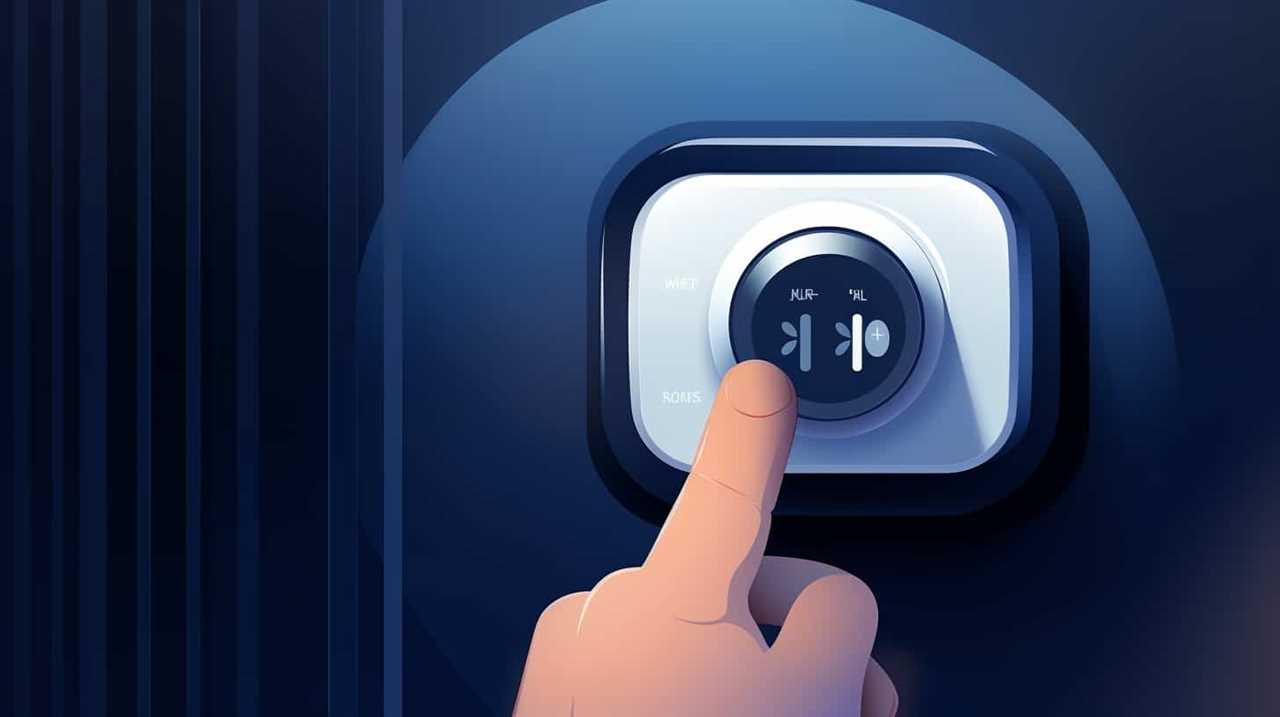
How Does the Cost of Using Renewable Energy Sources Compare to Traditional Energy Sources for Heating and Cooling With a Heat Pump?
Cost comparison between renewable energy sources and traditional energy sources for heating and cooling with a heat pump is crucial. Our analysis will include factors such as installation costs, energy efficiency, and long-term environmental impact to determine the most cost-effective and sustainable solution.
Can You Provide Guidance on How to Calculate the Potential Energy Savings From Using Renewable Energy With a Heat Pump System?
Calculating savings from using renewable energy sources with a heat pump system involves evaluating the energy output of the heat pump and comparing it to the energy input from renewable sources.
Are There Any Government Incentives or Rebates Available for Homeowners Who Choose to Incorporate Renewable Energy Sources Into Their Heat Pump Systems?
Yes, there are government incentives and homeowner rebates available for incorporating renewable energy sources into heat pump systems. These incentives can help offset the initial costs and make it more affordable for homeowners.
Conclusion
In conclusion, integrating renewable energy sources with heat pump systems can greatly boost their performance and efficiency.
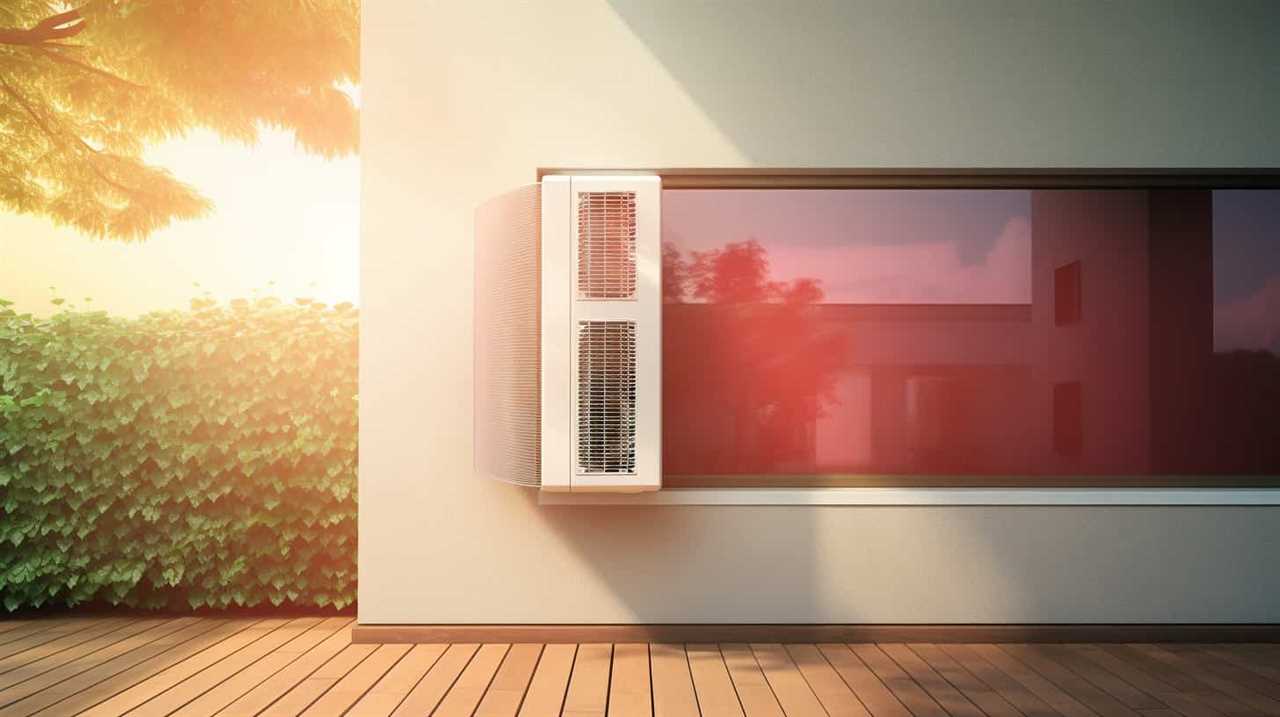
By harnessing the power of the sun, wind, or other renewable sources, heat pumps can operate more effectively, providing cost-effective heating and cooling solutions.
Like a symphony conductor harmonizing different instruments, combining renewable energy with heat pumps creates a powerful and sustainable performance, reducing carbon emissions and benefiting both the environment and homeowners.
Residential and Commercial Applications
Experience Unprecedented Efficiency With Heat Pump HVAC Systems

Picture a life free from the stress of expensive energy bills or ineffective heating and cooling systems. Heat pump HVAC systems offer unparalleled efficiency and comfort. By harnessing renewable energy sources, these cutting-edge systems provide both heating and cooling capabilities, all while remaining eco-friendly.
Say goodbye to wasteful energy consumption and hello to a more sustainable future. Let’s explore the advantages and key features of these high-efficiency heat pump systems and discover how they can help us maximize energy savings.
Key Takeaways
- Heat pump HVAC systems provide both heating and cooling functionalities.
- They are highly energy-efficient, resulting in lower energy consumption and reduced utility bills.
- These systems utilize renewable energy sources and require significantly less energy compared to traditional heating systems.
- Heat pump HVAC systems contribute to a more sustainable future by reducing reliance on fossil fuels and minimizing carbon emissions.
The Advantages of Heat Pump HVAC Systems
We’re about to delve into the benefits of heat pump HVAC systems.
Heat pump systems offer numerous advantages and benefits that make them a popular choice for those seeking efficient and cost-effective heating and cooling solutions. One of the key advantages of heat pump HVAC systems is their ability to provide both heating and cooling functionalities, making them versatile and convenient.
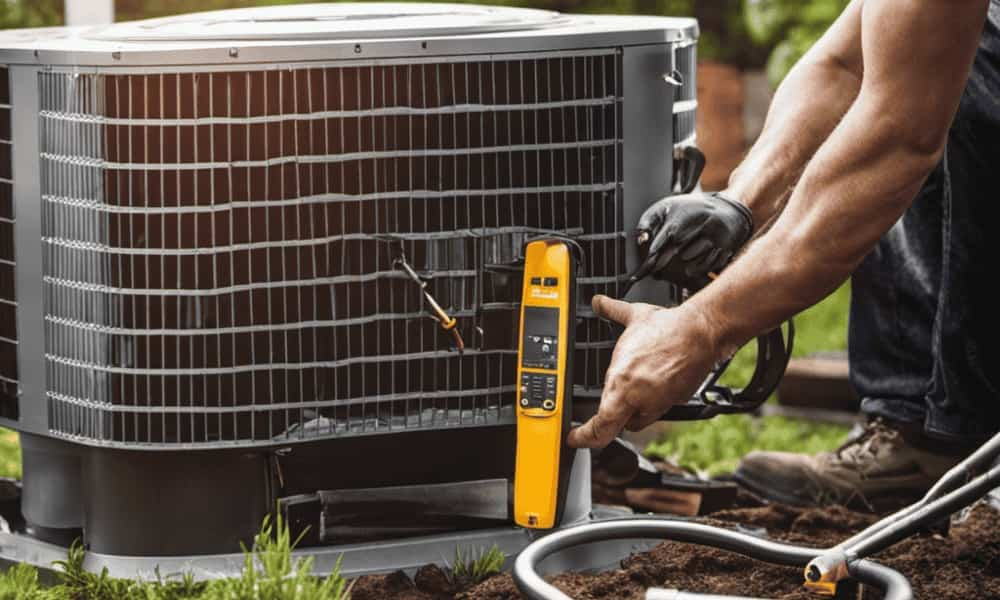
Additionally, heat pumps are highly energy-efficient, as they transfer heat from one area to another instead of generating it, resulting in lower energy consumption and reduced utility bills. They also provide consistent and even temperatures throughout the home, ensuring optimal comfort.
Furthermore, heat pump systems are environmentally friendly, as they produce fewer greenhouse gas emissions compared to traditional HVAC systems.
As we explore further, we’ll discuss how heat pump systems improve energy efficiency and contribute to a more sustainable future.
How Heat Pump Systems Improve Energy Efficiency
One of the ways heat pump systems improve energy efficiency is by utilizing a combination of renewable energy sources and advanced technology. These systems are designed to extract heat from the surrounding air, ground, or water, and transfer it indoors during the winter months for heating purposes. This process requires significantly less energy compared to traditional heating systems, resulting in energy saving benefits for homeowners.
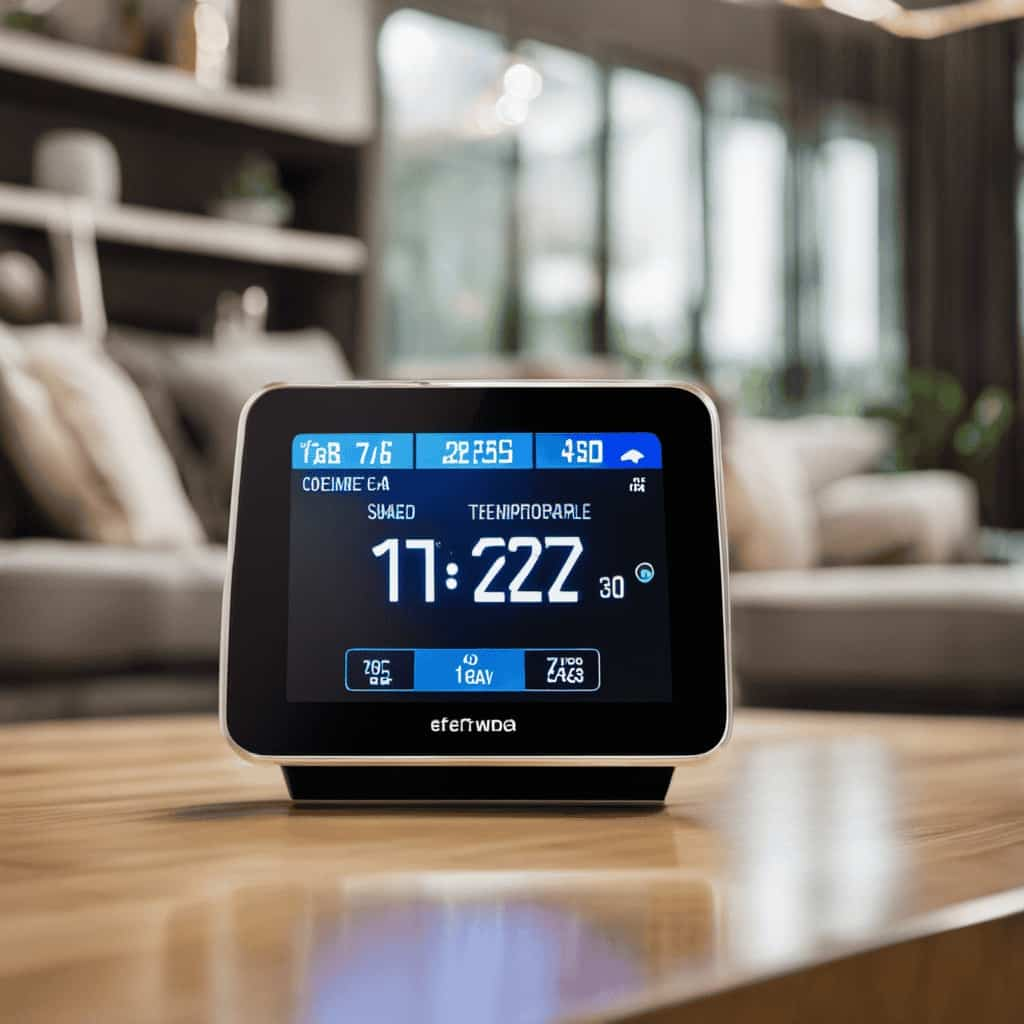
By using renewable energy sources such as the air and ground, heat pump systems provide an eco-friendly heating solution that reduces reliance on fossil fuels and minimizes carbon emissions. Additionally, heat pump systems employ advanced technology, such as variable speed compressors and smart controls, to optimize performance and maximize energy efficiency. These features allow homeowners to enjoy a comfortable indoor environment while minimizing energy consumption and reducing utility costs.
With their energy saving benefits and eco-friendly heating capabilities, heat pump systems are an excellent choice for those seeking an efficient and sustainable heating solution.
In the next section, we’ll explore the key features of high efficiency heat pump systems.
Key Features of High Efficiency Heat Pump Systems
Our high efficiency heat pump systems offer a range of key features that enhance performance and optimize energy consumption. One of the main advantages of these systems is their cost-effective installation. High efficiency heat pumps are designed to be easily installed in both new and existing buildings, reducing the overall installation costs. This makes them an attractive option for homeowners and businesses looking to upgrade their HVAC systems without breaking the bank.
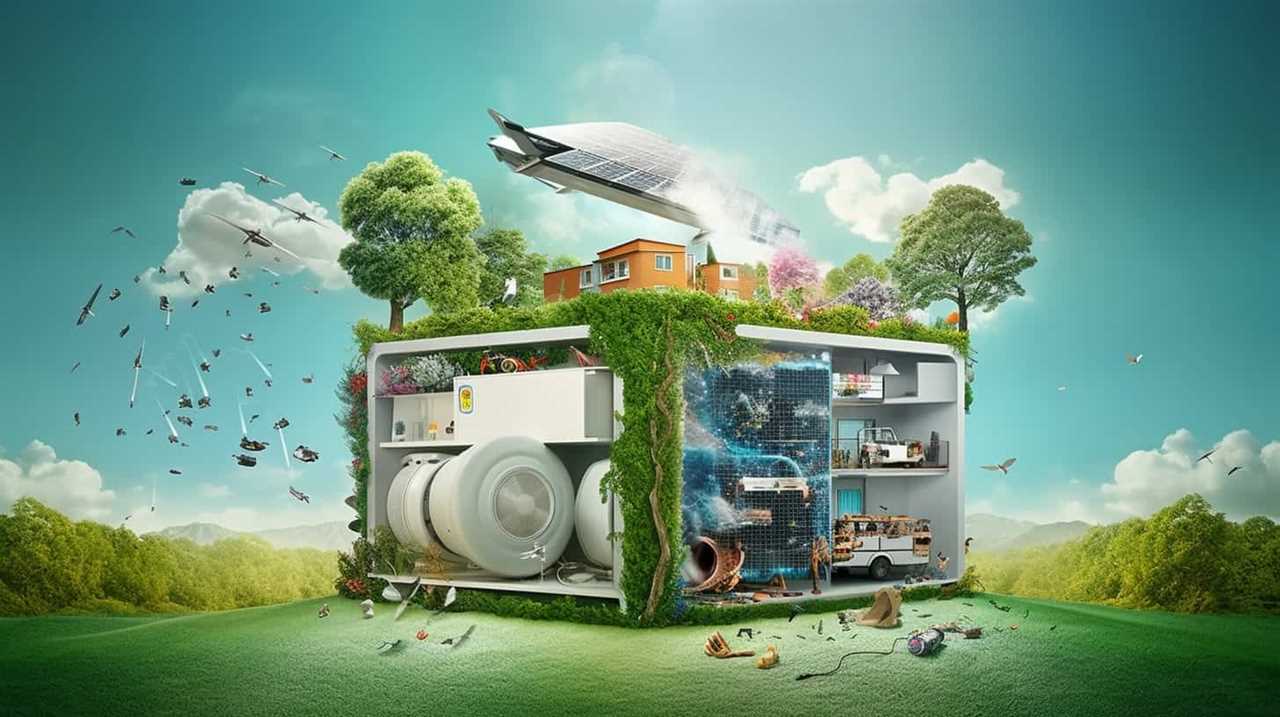
Another key feature of high efficiency heat pump systems is the benefits of zone heating. These systems allow for the creation of multiple heating zones within a building, each with its own thermostat. This enables precise temperature control in different areas, maximizing comfort and energy savings. By only heating the areas that are being used, zone heating eliminates wasteful energy consumption and reduces utility bills.
Tips for Maximizing Energy Savings With Heat Pump HVAC
To achieve maximum energy savings with heat pump HVAC systems, it’s important to implement proper maintenance and utilize smart thermostat settings. By following these energy-saving techniques and keeping up with maintenance requirements, you can optimize the efficiency of your heat pump system and reduce your energy consumption.
One key energy-saving technique is to regularly clean or replace the air filters in your heat pump. Dirty filters restrict airflow, making the system work harder and use more energy. Additionally, scheduling regular maintenance checks with a certified technician will ensure that your heat pump is operating at peak efficiency.
Another way to maximize energy savings is by utilizing smart thermostat settings. Programmable thermostats allow you to set different temperature levels throughout the day, ensuring that your heat pump isn’t running unnecessarily when you’re away or asleep.
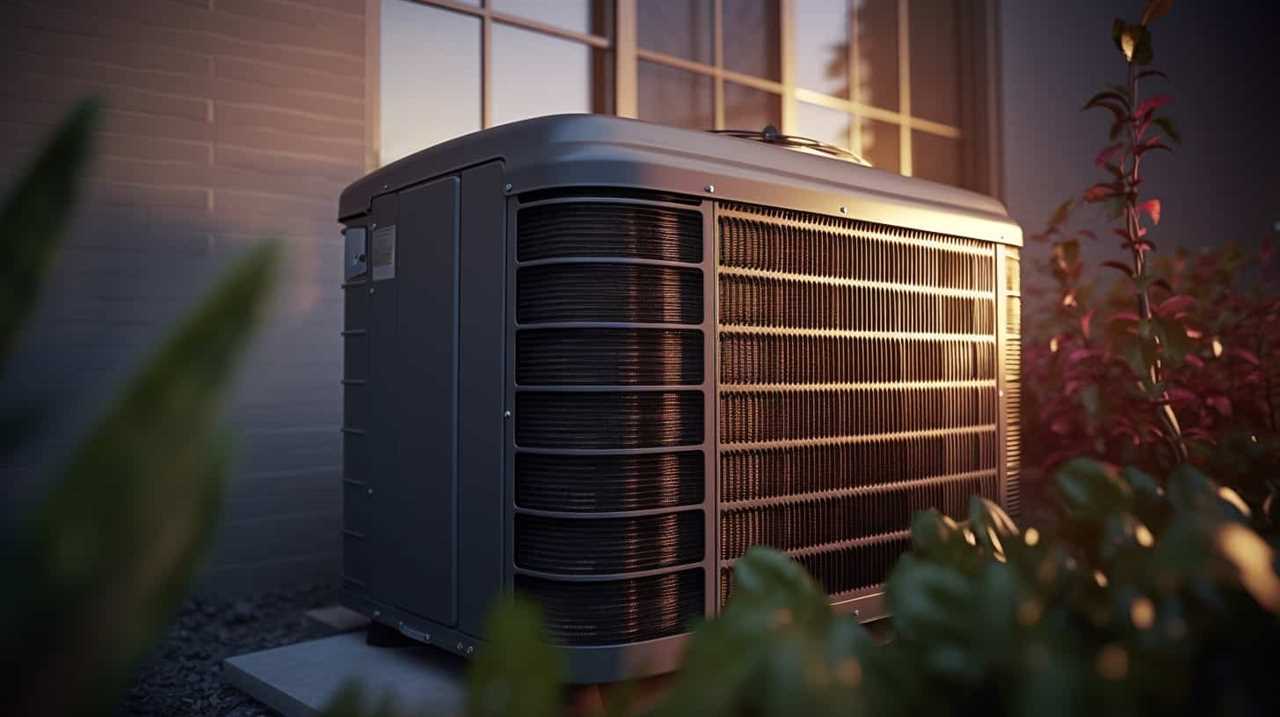
The Future of HVAC: Heat Pump Technology and Efficiency
With advancements in heat pump technology, we can expect greater efficiency and improved performance in the future of HVAC systems. One key factor that will contribute to this is the integration of smart thermostats.
These devices allow for precise control over the heating and cooling of a space, optimizing energy usage and reducing waste. Smart thermostats can learn and adapt to the user’s preferences, automatically adjusting the temperature based on occupancy and time of day.
Additionally, the future of HVAC systems will see a greater integration of renewable energy sources. Heat pumps are already capable of utilizing renewable energy, such as geothermal or solar power, to provide heating and cooling.
This integration will further reduce the carbon footprint of HVAC systems and help create a more sustainable and efficient future.

Frequently Asked Questions
How Much Does a Heat Pump HVAC System Cost to Install?
Heat pump HVAC system installation cost varies depending on factors such as system size, complexity of installation, and location. It’s important to consider these factors to accurately determine the cost of installing a heat pump HVAC system.
Can a Heat Pump System Be Used for Both Heating and Cooling?
Yes, a heat pump system can be used for both heating and cooling. Heat pump efficiency is achieved through the transfer of heat rather than the generation of heat, resulting in lower energy consumption. This is one of the advantages of heat pump systems.
Are Heat Pump HVAC Systems Suitable for All Types of Homes?
Heat pump HVAC systems have their pros and cons in older homes. We can maximize energy savings by ensuring proper insulation and regular maintenance. These systems offer unprecedented efficiency, but may require modifications for certain types of homes.
How Often Should a Heat Pump HVAC System Be Serviced or Maintained?
We recommend regular maintenance for optimal performance and longevity of your heat pump HVAC system. Signs of a malfunctioning heat pump include insufficient heating or cooling, strange noises, and increased energy consumption. Schedule professional heat pump repair when necessary.
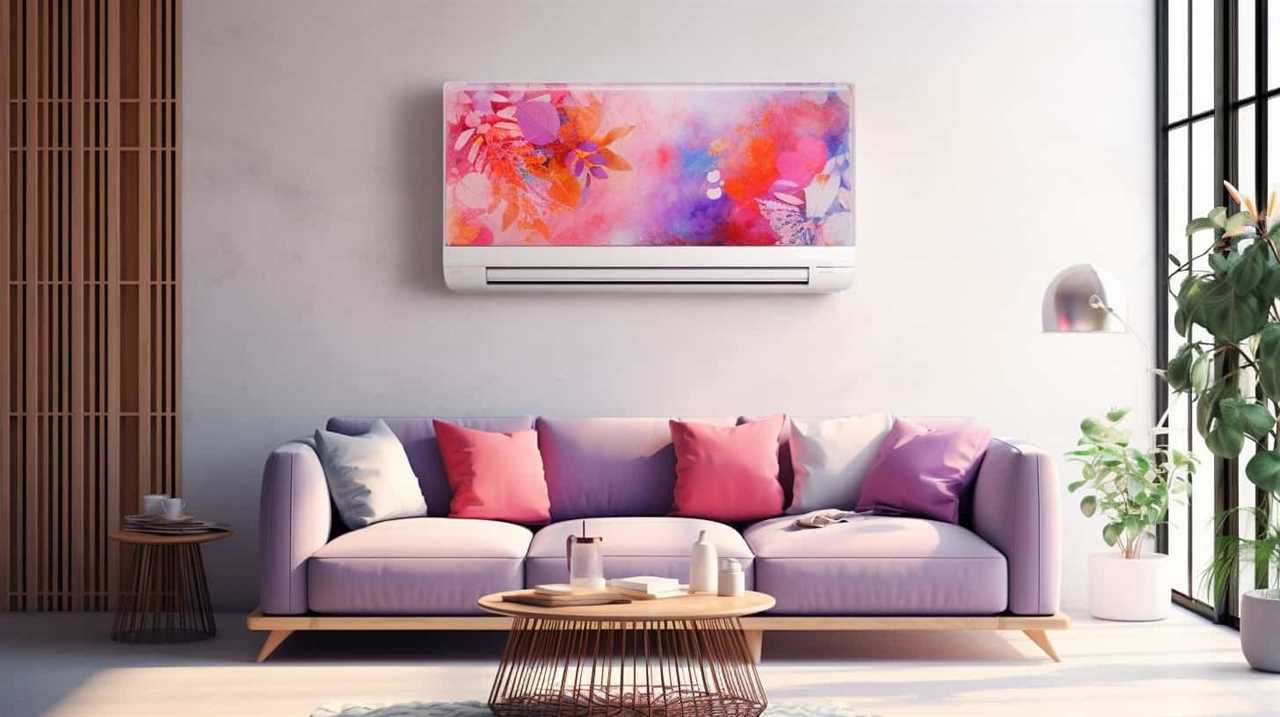
Are There Any Government Incentives or Rebates Available for Installing a Heat Pump HVAC System?
Yes, there are government incentives available for installing a heat pump HVAC system. These incentives aim to promote energy savings and encourage the use of more efficient heating and cooling technologies.
Conclusion
In conclusion, heat pump HVAC systems offer unprecedented efficiency for heating and cooling needs.
With an average energy efficiency rating of over 300%, these systems can produce three times more heat energy than the electricity they consume.
Imagine the savings and environmental benefits of using a system that can generate heat from the air or ground, making it a sustainable and cost-effective solution for any home or building.
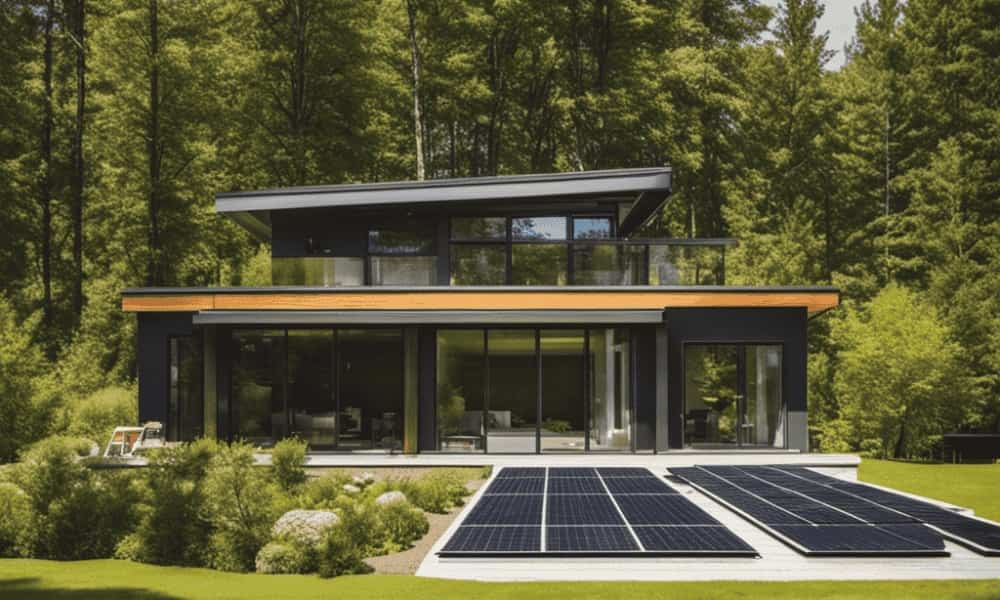
Upgrade to a heat pump HVAC system today and experience the power of efficiency.
Residential and Commercial Applications
FAQs: Enhancing Home Energy Efficiency With Heat Pumps

Are you fed up with sky-high energy expenses and seeking ways to boost your home’s efficiency? Heat pumps could be the answer! Allow us to address all your inquiries regarding how heat pumps can improve the energy efficiency of your home.
From understanding how they work to maximizing their potential, we’ve got you covered. Say goodbye to wasted energy and hello to a more sustainable and cost-effective home.
Let’s dive in and start saving together!
Key Takeaways
- Heat pumps are an energy-efficient option for transferring heat from a colder area to a warmer area.
- They can significantly reduce heating and cooling costs and have a lower environmental impact compared to conventional systems.
- The type of heat pump should match the heating and cooling needs of the home, taking into account factors such as climate and insulation.
- Maximizing the energy-saving potential of heat pumps can be achieved through the use of smart thermostats, improving insulation, and implementing other energy-saving practices.
How Do Heat Pumps Work to Enhance Home Energy Efficiency
To understand how heat pumps work to enhance home energy efficiency, we need to examine their key components and operational principles.

Heat pumps are versatile devices that transfer heat from one place to another. They work by using a small amount of energy to move heat from a colder area to a warmer area, making the warm space warmer and the cool space cooler.
The mechanics of a heat pump involve a refrigerant that absorbs heat in the evaporator coil and releases it in the condenser coil.
There are different types of heat pumps, including air-source, ground-source, and water-source heat pumps. Each type has its own advantages and is suitable for different environments.
Understanding the mechanics and types of heat pumps is crucial in realizing the key benefits they offer for improving energy efficiency.
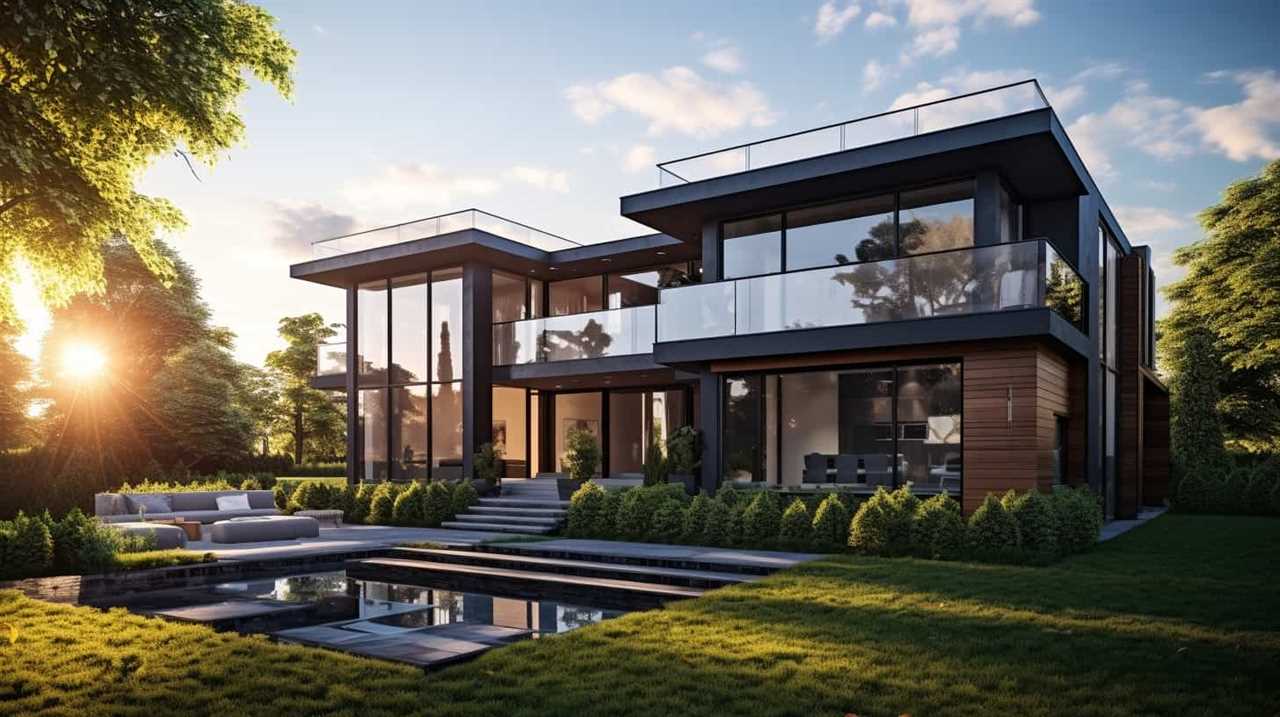
What Are the Key Benefits of Using Heat Pumps for Improving Energy Efficiency
One of the key benefits of using heat pumps for improving energy efficiency is that they can significantly reduce heating and cooling costs. Heat pumps work by transferring heat from one area to another, rather than generating heat, which makes them much more efficient than traditional heating and cooling systems.
This energy-saving feature can result in substantial savings on monthly utility bills, allowing homeowners to allocate their funds towards other needs. Additionally, heat pumps have a lower environmental impact compared to conventional systems, as they rely on renewable energy sources such as the air or ground.
Are Heat Pumps Suitable for All Types of Homes
Heat pumps are suitable for most homes, regardless of their size or layout. When it comes to heat pump compatibility, there are a few factors to consider. First, the type of heat pump you choose should match your heating and cooling needs. For example, if you live in a colder climate, you may need a heat pump with a higher heating capacity. Additionally, the size of your home and the layout of your ductwork will also impact the effectiveness of the heat pump. It’s important to choose the right heat pump that can adequately heat and cool your home. In the table below, you can see some common types of heat pumps and their suitability for different types of homes.
| Heat Pump Type | Suitable for Small Homes | Suitable for Medium Homes | Suitable for Large Homes |
|---|---|---|---|
| Air Source | Yes | Yes | No |
| Ground Source | Yes | Yes | Yes |
| Ductless | Yes | Yes | Yes |
When choosing a heat pump for energy efficiency, several factors should be considered.
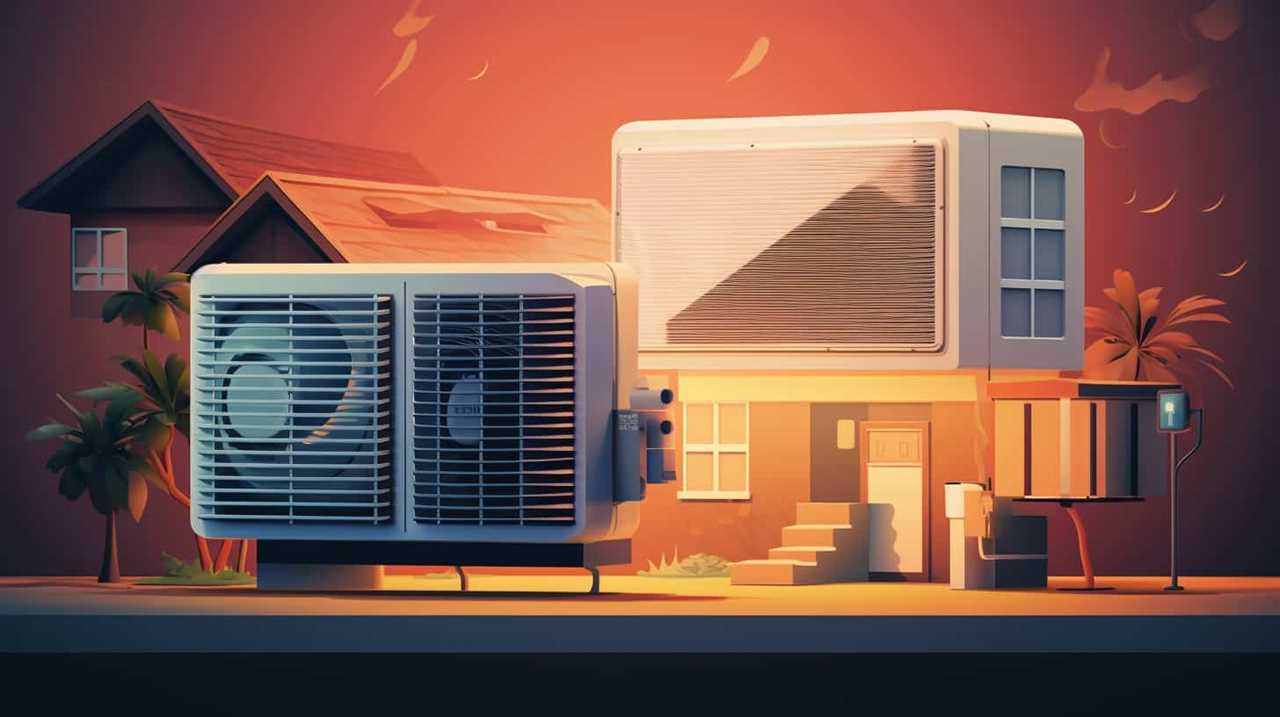
What Factors Should Be Considered When Choosing a Heat Pump for Energy Efficiency
When considering energy efficiency, we should take into account several factors when choosing a heat pump. Factors such as the size of the home, climate, insulation, and budget are crucial considerations.
Firstly, the size of the home plays a significant role in determining the appropriate heat pump size. A unit that’s too small will struggle to heat or cool the space efficiently, while a unit that’s too large will result in unnecessary energy usage.
Secondly, climate is important to consider as heat pumps work differently in different climates. In colder climates, for example, a heat pump with a higher heating capacity is necessary.
Additionally, the level of insulation in the home affects the heat pump’s efficiency. A well-insulated home will require less energy to maintain a comfortable temperature.
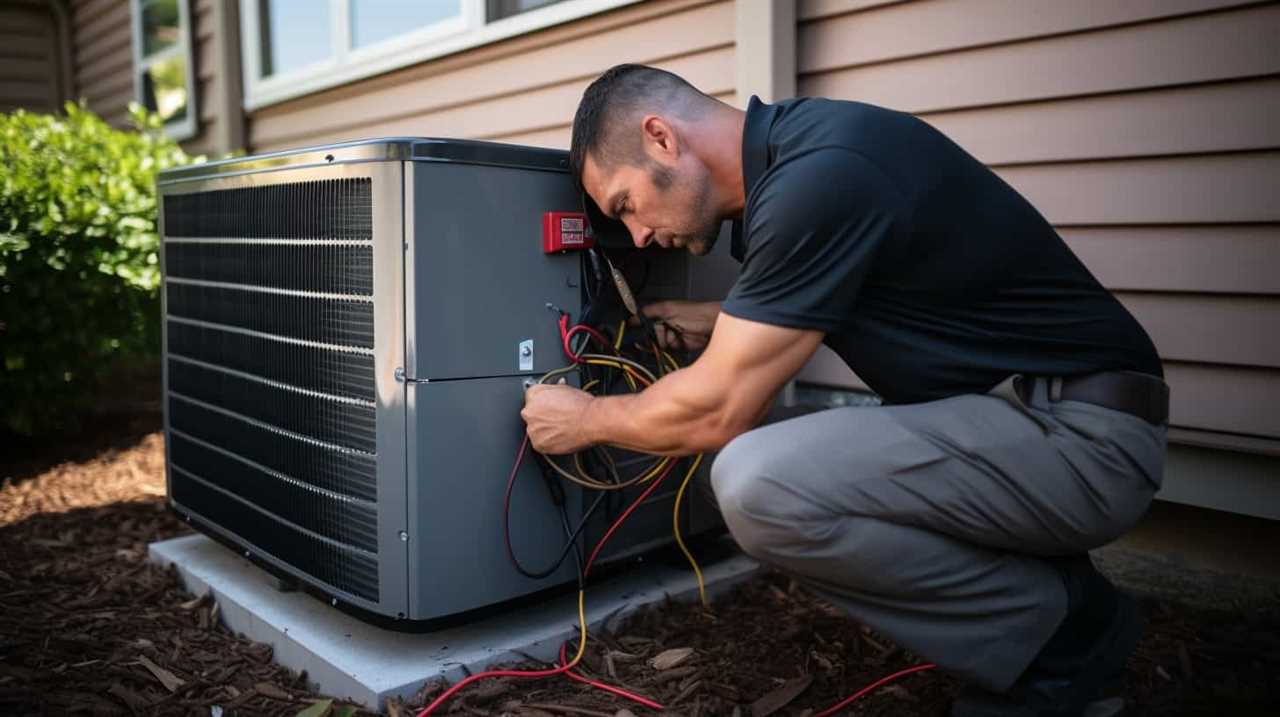
Lastly, budget considerations are essential when choosing a heat pump. While more efficient models may have a higher upfront cost, they can provide long-term energy savings.
By considering these factors, homeowners can make an informed decision that maximizes energy efficiency.
Now, let’s explore how homeowners can further maximize the energy-saving potential of heat pumps.
How Can Homeowners Maximize the Energy-Saving Potential of Heat Pumps?
To fully optimize the energy-saving potential of heat pumps, homeowners should regularly maintain and monitor their system.
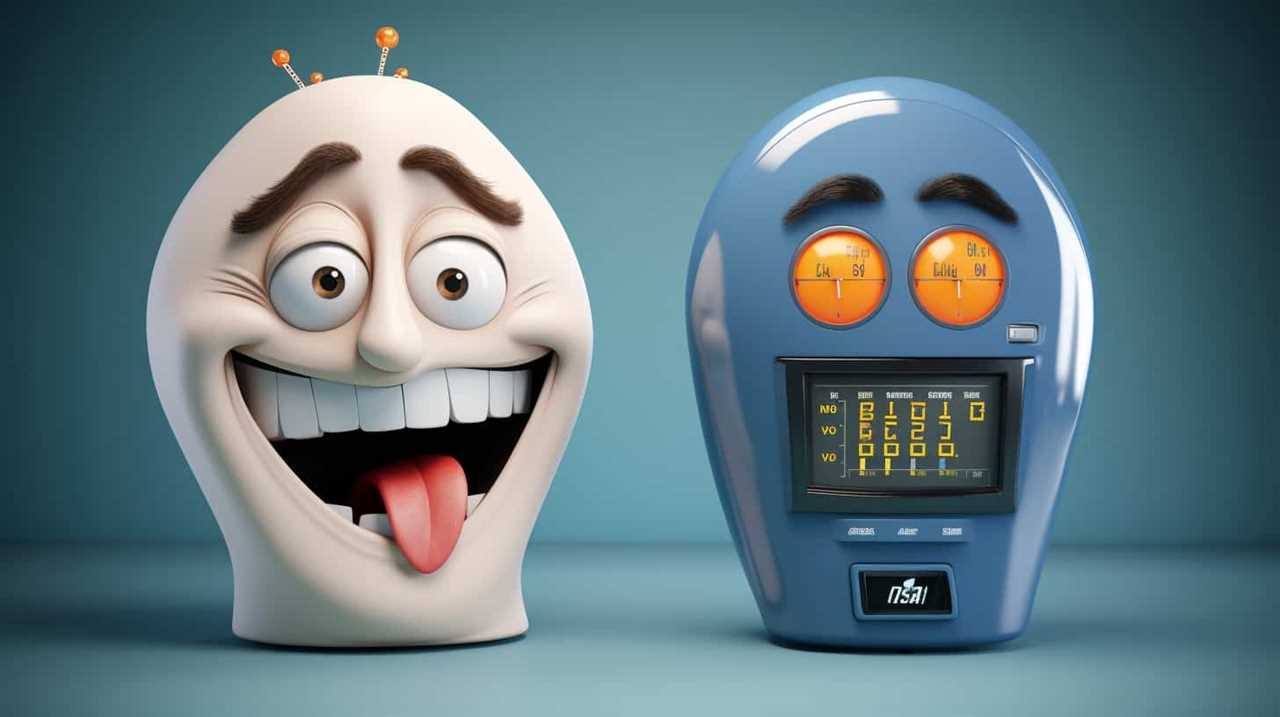
One way to maximize energy efficiency is through smart thermostat installation. By using a smart thermostat, homeowners can easily control and adjust the temperature settings in their home, ensuring that the heat pump operates at its most efficient levels.
Additionally, insulation improvements can greatly enhance energy savings. Proper insulation helps to minimize heat loss and keep the conditioned air inside the home, reducing the workload on the heat pump. By insulating attics, walls, and floors, homeowners can create a more energy-efficient environment and increase the overall effectiveness of their heat pump system.
Regular maintenance, smart thermostat installation, and insulation improvements are key steps to fully harness the energy-saving potential of heat pumps.
Frequently Asked Questions
How Much Does It Cost to Install a Heat Pump for Home Energy Efficiency?
Cost considerations and the installation process are important factors when considering home energy efficiency with heat pumps. We can help you determine the cost and guide you through the installation process.
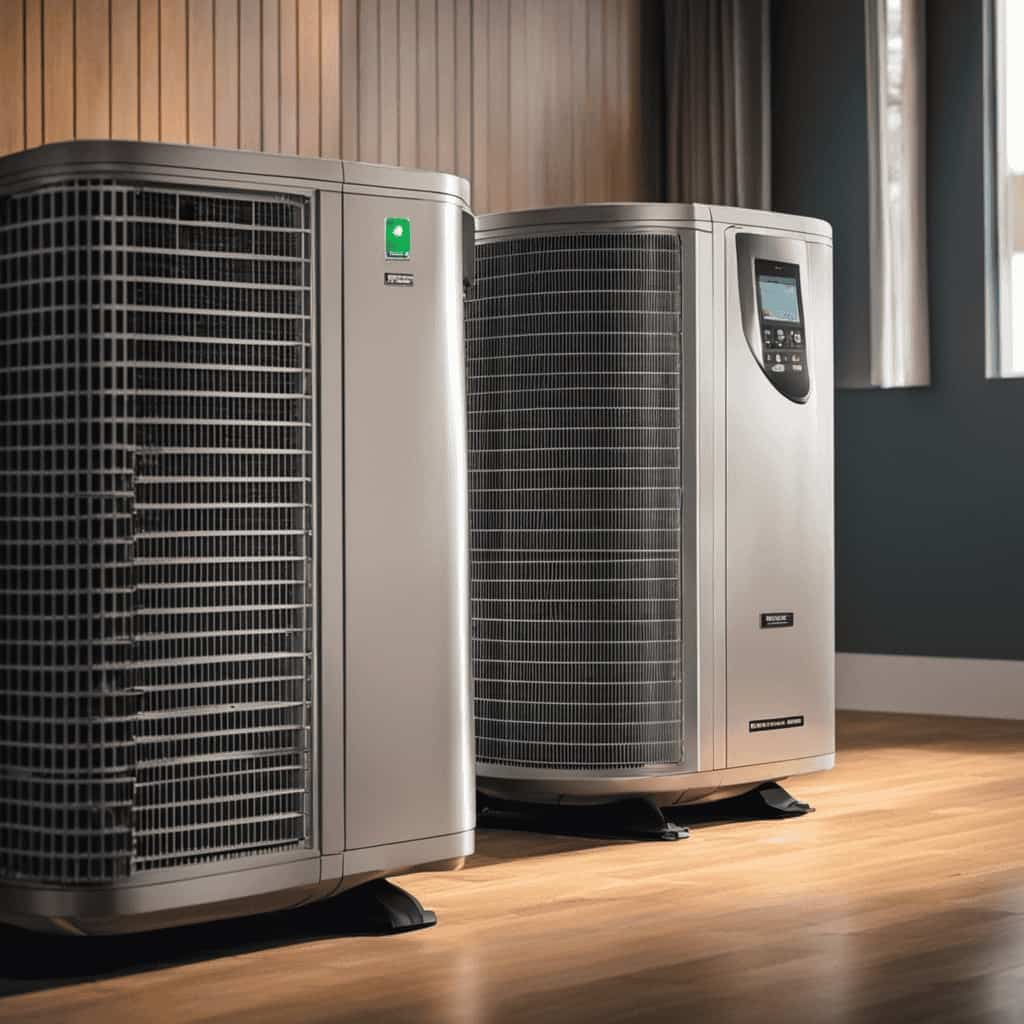
What Is the Average Lifespan of a Heat Pump?
On average, heat pumps have a lifespan of 15-20 years. When considering the cost of installation, it’s important to factor in long-term savings on energy bills. Our team is here to assist you.
Can a Heat Pump Be Used for Both Heating and Cooling?
Yes, a heat pump can be used for both heating and cooling. It offers the benefits of efficient temperature control and cost savings. During the heat pump installation process, we ensure that it functions optimally for all your heating and cooling needs.
Are There Any Government Incentives or Tax Credits Available for Installing a Heat Pump?
Yes, there are government incentives and tax credits available for installing a heat pump. These can help offset the initial cost and make it more affordable for homeowners to enhance their home’s energy efficiency.
Do Heat Pumps Require Regular Maintenance and Servicing?
Regular maintenance and servicing for heat pumps is essential for their optimal performance and longevity. It helps identify and address common issues that can arise, ensuring the benefits of energy efficiency and comfort for our homes.
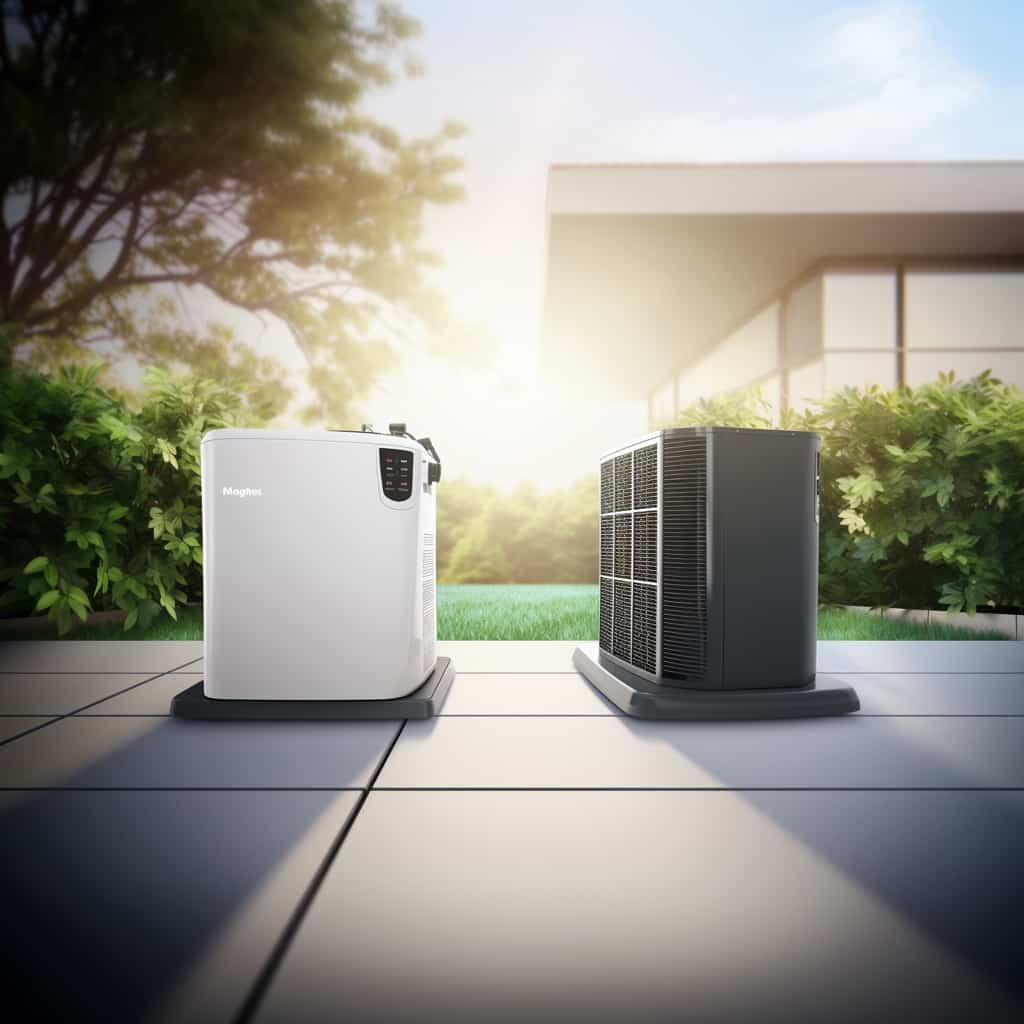
Conclusion
Heat pumps are the ultimate game-changer when it comes to enhancing home energy efficiency. With their amazing ability to heat and cool, they’re like superheroes saving us from energy wastage.
No matter what type of home you have, heat pumps are the solution you’ve been waiting for. Just make sure to consider factors like size and efficiency when choosing one.
With heat pumps, you can say goodbye to high energy bills and hello to a cozy, energy-efficient home.
-

 Residential and Commercial Applications2 weeks ago
Residential and Commercial Applications2 weeks agoBest Amana Heat Pump Reviews
-

 Thermal Energy Transfer2 weeks ago
Thermal Energy Transfer2 weeks agoBreakthroughs in Modern Heat Pump Systems: Thermal Energy Edition
-

 Residential and Commercial Applications2 weeks ago
Residential and Commercial Applications2 weeks agoBest Heat Pump
-

 Geothermal Heat Pumps3 months ago
Geothermal Heat Pumps3 months agoUpgrade Your Comfort with Our Efficient HVAC Systems
-

 Air Conditioning3 months ago
Air Conditioning3 months agoExploring Energy-Efficient Air Conditioning Heat Pumps
-

 Geothermal Heat Pumps3 months ago
Geothermal Heat Pumps3 months agoInnovative Geothermal Heat Pump Manufacturers Revolutionize Energy Efficiency
-

 Thermal Energy Transfer1 month ago
Thermal Energy Transfer1 month agoBoost Your Heat Pump Efficiency: Interactive Guide
-

 Residential and Commercial Applications2 weeks ago
Residential and Commercial Applications2 weeks agoBest Portable Heat Pump Heat & AC










